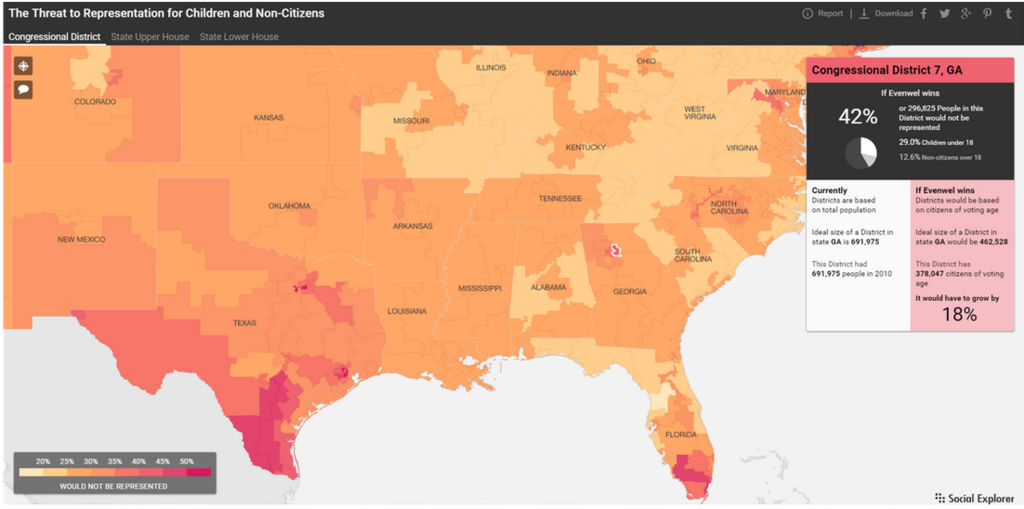By Allie Yee

Currently, political lines are drawn to capture roughly equal numbers of residents — including children and non-citizens ineligible to vote. But in Evenwel v. Abbott, two Texas voters in districts where most of the population is eligible to vote argue that the state Senate map based on total population weakens their vote compared to districts with significantly fewer eligible voters. Rather than drawing lines based on total population, they say, lines should be drawn based on the number of eligible voters.
Doing so would have important political implications, especially for the South. By discounting people ineligible to vote — those under 18, non-citizens and former felons, all populations that are disproportionately non-white — political representation would shift away from places that tend to be younger, more racially diverse and lean Democratic to areas with fewer nonvoters that tend to be older, whiter and lean Republican.
“Basing district lines on voting population exacerbates the exclusion of people who already face barriers to the ballot, especially people of color,” said Penda Hair, co-director of the Advancement Project, a civil rights advocacy group.
Andrew Beveridge, a Queens College sociology professor and president and co-founder of the online research tool Social Explorer, recently mapped the potential impacts of a ruling in favor of the plaintiffs. In a report and an accompanying graphic, Beveridge showed the estimated share of the population in current districts that would not be represented if Evenwel were to prevail. He found that nearly two-thirds of congressional districts and about half of state legislative districts would need to be redrawn.
According to Beveridge’s estimates, districts in Texas and the West that have higher shares of Latino populations would be most affected. But many areas in the South, a region that has experienced significant growth in its immigrant population since 1990, would also see a significant impact.
At the congressional level, districts in and around Atlanta, North Carolina’s central Piedmont region and northwest Arkansas have the highest shares of population that would lose representation. In Georgia’s 7th Congressional District currently represented by Rep. Rob Woodall (R), 42 percent of the population are not citizens of voting age and would not be counted. In North Carolina’s 12th Congressional District — named the nation’s most gerrymandered and represented by Rep. Alma Adams (D) — over a third of the population would not be represented.
At the state level, legislative districts in cities including Nashville, Tennessee and Louisville, Kentucky — major new immigrant hubs in the region — would also lose representation. And in Arkansas’ state House District 89 — home to Springdale, where immigrants make up a large share of the population — nearly 60 percent of residents would not be represented.
Beveridge found that districts likely to lose representation at congressional and state levels are more racially diverse and tend to have lower average incomes and levels of educational attainment and higher unemployment than districts that wouldn’t lose representation. Five congressional seats nationwide would switch from Democratic to Republican, according to Beveridge’s analysis, while current Republican majorities would gain even more power in state legislatures in Florida and Texas.
Last November, a lower court in Austin, Texas upheld the state’s right to use total population to apportion districts. But rather than affirming the lower court’s decision, the Supreme Court decided in May to hear arguments in the case. It was brought by the Project on Fair Representation, a conservative advocacy group that also brought the 2013 case Shelby County v. Holder, which led to the gutting of the Voting Rights Act.
A decision in the Evenwel case is expected next year.
Allie Yee joined the Institute in July 2014 and splits her time between researching demographic changes in the South and supporting the Institute’s development efforts. Before coming to the Institute, Allie was a Fellow at the Z. Smith Reynolds Foundation where she assisted grantmaking to nonprofits in North Carolina across a range of issues and researched independent, nonprofit media. Allie graduated from Duke University in 2012 with a degree in Public Policy Studies.
Don Rojas,
Director of Communications,
Institute of the Black World 21st Century (IBW),
51 Millstone Road,
Randallstown, MD 21133
Ph: 410-844-1031
Web: www.ibw21.org














